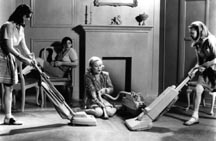Gay Bashin'
'But I'm A Cheerleader' spoofs all those crazy homophobes
By Ellison Walcott
In a homophobic world, gays are perceived as voodoo sex bandits who want to convert everyone to their lifestyles, much like sidewalk preachers passing out pamphlets. Lately, much to the intolerants' chagrin, gay male characters have popped up everywhere (so to speak).
Because, as with all mainstream culture, Hollywood eventually decided to demystify homosexuality and turn it into material.
Now there's Will and Grace on Thursdays. The Celluloid Closet took on the topic in a scholarly, documentary fashion. There was In and Out at the movies, with the straight Kevin Kline and avowedly heterosexual Tom Selleck playing gay characters. Even husky, masculine John Goodman has taken a role as a gay character in a Fox sitcom due out this fall.
(And if actors like Selleck, Tom Cruise, Richard Gere and others still feel compelled to issue press releases confirming their straight, manly manliness, well, that's their prerogative.)
Lesbian characters, however, just haven't been as quickly welcomed into living room televisions and Blockbuster movie houses. (Or if they are, it's usually on cable - via HBO programming like If These Walls Could Talk 2.)
Nonetheless, director Jamie Babbit does take a crack at it in the newly released But I'm a Cheerleader. She tackles the thorny, overly debated issue of homosexuality and turns the rhetorical bouquet into a campy teenage comedy. Megan (Natasha Lyonne) is a cheerleader. She dates the captain of the football team, is pretty, popular, a good student, and a devoted daughter. Just as she is ready to go cheer with her buddies at the football playoffs, her friends and parents stage an intervention and tell her that they think she is a lesbian. The symptoms are clear: for one, she's a vegetarian; two, she has a Melissa Etheridge poster; and to beat the band, she sleeps on Georgia O'Keefe linens that are filled with the artist's rendering of those yonic flowers.
 Her parents send her off to a five-step dehomo-ing house because they believe her "lesbian problem" can be cured. Megan is thunderstruck when she arrives at True Directions, a draconian camp where reclaiming one's sexual orientation boils down to learning the dos and don'ts of your own gender. The "addicts" attend meetings to find the root of their homosexuality and analyze their "compulsion." There are rules to follow, and as long as one abides by the lay of the land and successfully completes the five steps, one can graduate from True Directions. Thereafter they will be recognized as full-fledged heterosexuals.
Her parents send her off to a five-step dehomo-ing house because they believe her "lesbian problem" can be cured. Megan is thunderstruck when she arrives at True Directions, a draconian camp where reclaiming one's sexual orientation boils down to learning the dos and don'ts of your own gender. The "addicts" attend meetings to find the root of their homosexuality and analyze their "compulsion." There are rules to follow, and as long as one abides by the lay of the land and successfully completes the five steps, one can graduate from True Directions. Thereafter they will be recognized as full-fledged heterosexuals.
When Megan first arrives she meets Mary (Cathy Moriarty), the women's guide back to the way God intended. Despite her pink dress and Doris Day hairdo, Mary would make any man want to shield his badoobies for fear she might kick them. She sports a military attitude with a seemingly asexual demeanor. For men, RuPaul Charles is the reprogrammer. He plays the role straight, as an athletic, mechanical, wood-chopping heterosexual, and he aspires to teach the other men to be the same. Grabbing one's family jewels is especially in order when you succeed at a task that is wholly masculine.
At the camp, women are uniformed in a Barbie/Catholic schoolgirl pink skirt and blouse. The men wear baby blue and look more like Richie Rich than the athlete the camp attempts to portray. All learn the finer points of their roles, as if they are debutantes or frat boys at a prep school. Like the men who learn to perform testosterone tasks, the women learn all the clichéd estrogen rituals. They vacuum, polish their nails, brush their hair, and change the diaper on a doll. Babbit succeeds at creating women who are multidimensional. The men, unfortunately, come off as stereotypical sissies who fear touching wrenches and can't chop wood or catch footballs. Obviously, the girls were her primary focus.
You never see the men's rooms (presumably blue). Of course, the female dormitory is decked out in so much pink and crimson trim it looks like Malibu Barbie threw up Pepto Bismol all over her Malibu playhouse.
The tone of the film rings of John Hughes - in particular, The Breakfast Club, in which several types of presumed misfits band together to get through a moment. In the process, they learn more about themselves and realize their commonalities. Clearly, thematically the films share a similarity, but Hughes is still the master of this particular domain.
At its heart, But I'm A Cheerleader fits into the genre of teenage fluff films as adolescent as American Pie. The plot boils down to an amalgam of platitudes: parents don't understand their teenagers. Friends desert you when you need them the most. You make new and unexpected associations. Often, depth is lacking in this film, but the effort is there.
Babbit's film may be a benchmark for its new twist on familiar subject matter, but it's no Sixteen Candles.